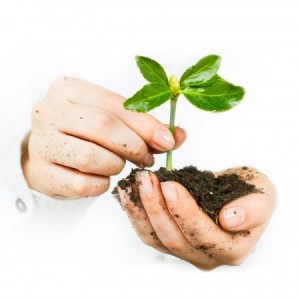 What is Green Landscaping and how can it enhance the value of your home in northern Virginia?
What is Green Landscaping and how can it enhance the value of your home in northern Virginia?
It used to be that having a perfectly manicured, green lawn was the holy grail of home ownership. Those were slower paced, simpler times. Now homebuyers look at that vast expanse of turf and think about water and maintenance bills and long hours mowing the lawn. Today’s buyer is looking for a healthier, low-maintenance landscape and the practice of green landscaping has evolved to fill this need.
Green landscaping refers to a variety of sustainable practices intended to minimize harm to the environment and conserve resources. While traditional landscapers seek to tame nature by installing non-native plants that require a high level of care and chemicals, the green landscaper takes advantage of natural cycles and processes to blend beauty with efficiency. Once a green landscape is established, little maintenance is needed, it pretty much runs itself.
Benefits of Green Landscaping
Green landscaping benefits both homeowners and the community at large.
The benefits to the homeowner include:
- Saving money. Green landscaping practices reduce water bills, gasoline bills and maintenance costs.
- Saving time. The time homeowners spend mowing the lawn, seeding and applying pesticides is greatly reduced.
- A more visually interesting yard. Instead of the usual flat, green expanse, green landscapes present a variety of shapes, colors and textures.
- Reducing the impact of drought and water restrictions; when everybody else’s lawn has wilted and turned brown, a green landscape will still look good.
Benefits to the environment and to the community at large include:
- Water conservation
- Reduced pesticide use. By using pesticides only when necessary, green landscaping reduces potential harm to birds, beneficial insects, fish and, ultimately, human beings.
- Reduced pollution of local streams by fertilizer runoff. Storm water runoff is considered one of the main sources of water pollution nationwide.
- Reduced load on storm water sewers.
- Providing a habitat for a more diverse range of plants and animals
- Reduced lawn mower exhaust and noise, reduced use of gasoline to power lawn mowers. This may not seem significant but studies have found that per hour of operation, a gas lawn mower emits 10-12 times as much hydrocarbon as a typical auto. A weed eater emits 21 times more and a leaf blower 34 times more.
- Reduced use of landfills through composting solid yard debris and recycling them into the landscape.
Enhanced Curb Appeal
Studies have shown that landscaping is extremely important in selling a home. Money Magazine determined that landscaping yields the greatest return on investment of any home improvement and Bob Vila, the TV home renovation guru, estimates that good landscape design can add up to 20% to the value of a home.
A Canadian study of more than 20,000 real estate listings found descriptions that focused more on curb appeal or general attractiveness helped a property sell faster than those focusing on value and price. The study also found that using the word “landscaping” hastened a sale by 20%.
A Virginia Tech study found desirable landscaping can enhance a home’s resale value by thousands of dollars. In the study, a home valued at $150,000 with no landscape (lawn only) gained $8,250 to $19,050 in value with a landscape that combined diverse colors and large plants. Landscaping also helps homes in “cookie-cutter” subdivisions gain curb appeal and stand out from their neighbors.
Going green doesn’t require a full-scale landscaping blitz. Simple, inexpensive steps such as planting trees for shade and windbreaks pay for themselves. In our local area, Master Gardeners from Prince William County’s Environment and Natural Resources program are available to make site visits to show homeowners how to improve water quality and reduce pesticide and fertilizer use. Fairfax County offers backyard composting and rain barrel-making workshops in the summer and fall.
Unlike kitchen and bathroom renovations which can quickly go obsolete or out of style, landscapes literally grow in value as trees and shrubs mature. With weather patterns becoming more extreme throughout the country, a landscape that can weather drought and storms with minimal maintenance can only appreciate in value.












Speak Your Mind
You must be logged in to post a comment.